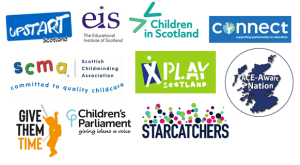Way back in July 2015, before plans for national standardised assessment were announced, two representatives of Upstart Scotland met with the Cabinet Secretary for Education and Skills, Angela Constance. We delivered a presentation about the need for change in early years education, explaining our deep concerns about a too-early start on formal learning. She listened with interest … but, as we left, murmured quietly: ‘I don’t think you’ll be getting a kindergarten stage any time soon.’
As we left the building, I asked my companion: ‘Does she know something we don’t know?’
The story of SNSA
 She did. Soon afterwards, Ms Constance was moved to another post, John Swinney became Secretary for Education and Skills and Nicola Sturgeon announced plans to test all Scottish children in literacy and numeracy, starting at P1. The Scottish National Standardised Assessments (SNSA) were a response to declining standards in literacy and numeracy, particularly the growth of a poverty-related attainment gap. They were developed very rapidly and introduced nationally in 2018.
She did. Soon afterwards, Ms Constance was moved to another post, John Swinney became Secretary for Education and Skills and Nicola Sturgeon announced plans to test all Scottish children in literacy and numeracy, starting at P1. The Scottish National Standardised Assessments (SNSA) were a response to declining standards in literacy and numeracy, particularly the growth of a poverty-related attainment gap. They were developed very rapidly and introduced nationally in 2018.
The 2019 report on SNSA from the Parliamentary Education and Skills Committee lists many questions about the introduction of national assessment throughout primary/early secondary education in general. Upstart Scotland however, has continued to focus on the potentially damaging effects of testing literacy and numeracy skills in Primary 1, in the face of general international acceptance that assessment at age five should be concerned with children’s overall development.
 We tried to contact John Swinney several times between 2015 and 2018 with no success. In 2018 we launched the ‘Play Not Tests for P1’ campaign with an explanatory document and worked with a coalition of organisations with similar concerns. This resulted in a parliamentary vote to scrap the P1 tests. Instead, Mr Swinney appointed an Independent Review of the SNSA, to which Upstart submitted documentary evidence.
We tried to contact John Swinney several times between 2015 and 2018 with no success. In 2018 we launched the ‘Play Not Tests for P1’ campaign with an explanatory document and worked with a coalition of organisations with similar concerns. This resulted in a parliamentary vote to scrap the P1 tests. Instead, Mr Swinney appointed an Independent Review of the SNSA, to which Upstart submitted documentary evidence.
While all this was going on, we discovered something else Upstart didn’t know about back in 2015.
The story of EDI
In 2012, before Holyrood began considering the idea of national standardised assessment, a Canadian assessment instrument for use with five-year-old children – the Early Development Instrument (EDI) – was piloted in East Lothian.
EDI is based on the growing body of scientific literature about early child development and how cultural factors can help or hinder children’s potential to learn (this is the same research-based evidence that inspired the Upstart Scotland campaign). It covers six areas: social competence, emotional maturity, physical health and well-being, language and cognitive skills, and communication skills.
The EDI is used successfully in both Canada and Australia (where the school starting age is six) with all five-year-old children. The results are used to inform the Canadian and Australian authorities in all local areas about the sorts of targeted interventions that can enhance overall development, thus leading to increased success when formal education begins.
Scotland, as outlined above, chose instead to assess aspects of academic learning at age five. As far as we know, the only other countries worldwide that assess the literacy and numeracy skills of five-year-old children are England and the USA, neither of which has an impressive record in terms of childhood well-being or (given levels of national investment) ‘excellence and equity’ in educational achievement.
And even though the SNSA is claimed to be ‘formative’, and thus not as ‘high stakes’ as US and English tests, international experts in formative assessment have pointed out that, at such an early age, results are not reliable.
All the international literature suggests that the most helpful type of assessment of five-year-old children focuses on their overall developmental level – physical, social, emotional and cognitive.
So Upstart’s ‘East Lothian question’ is: ‘Why the P1 SNSA, rather than EDI?’





